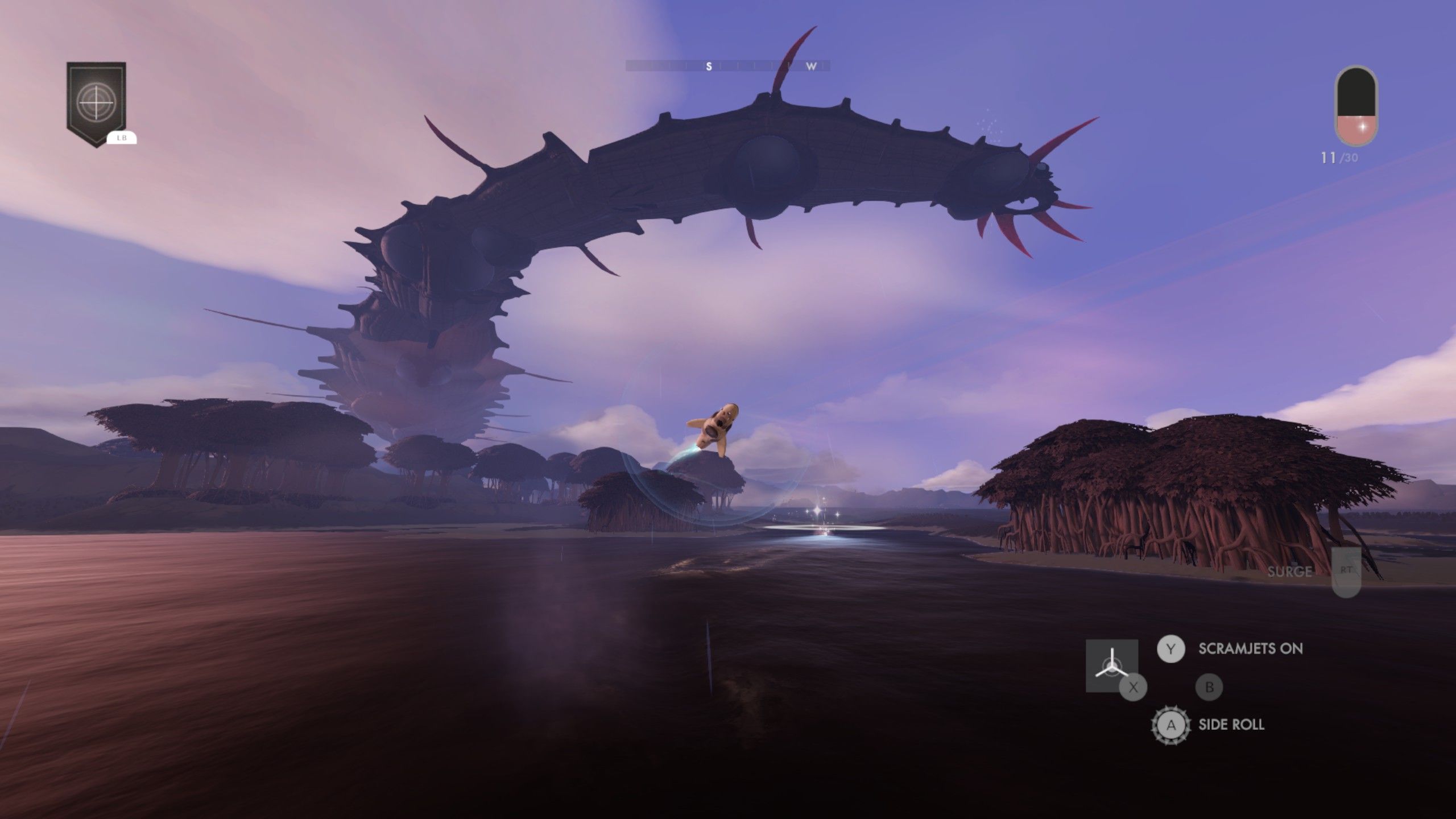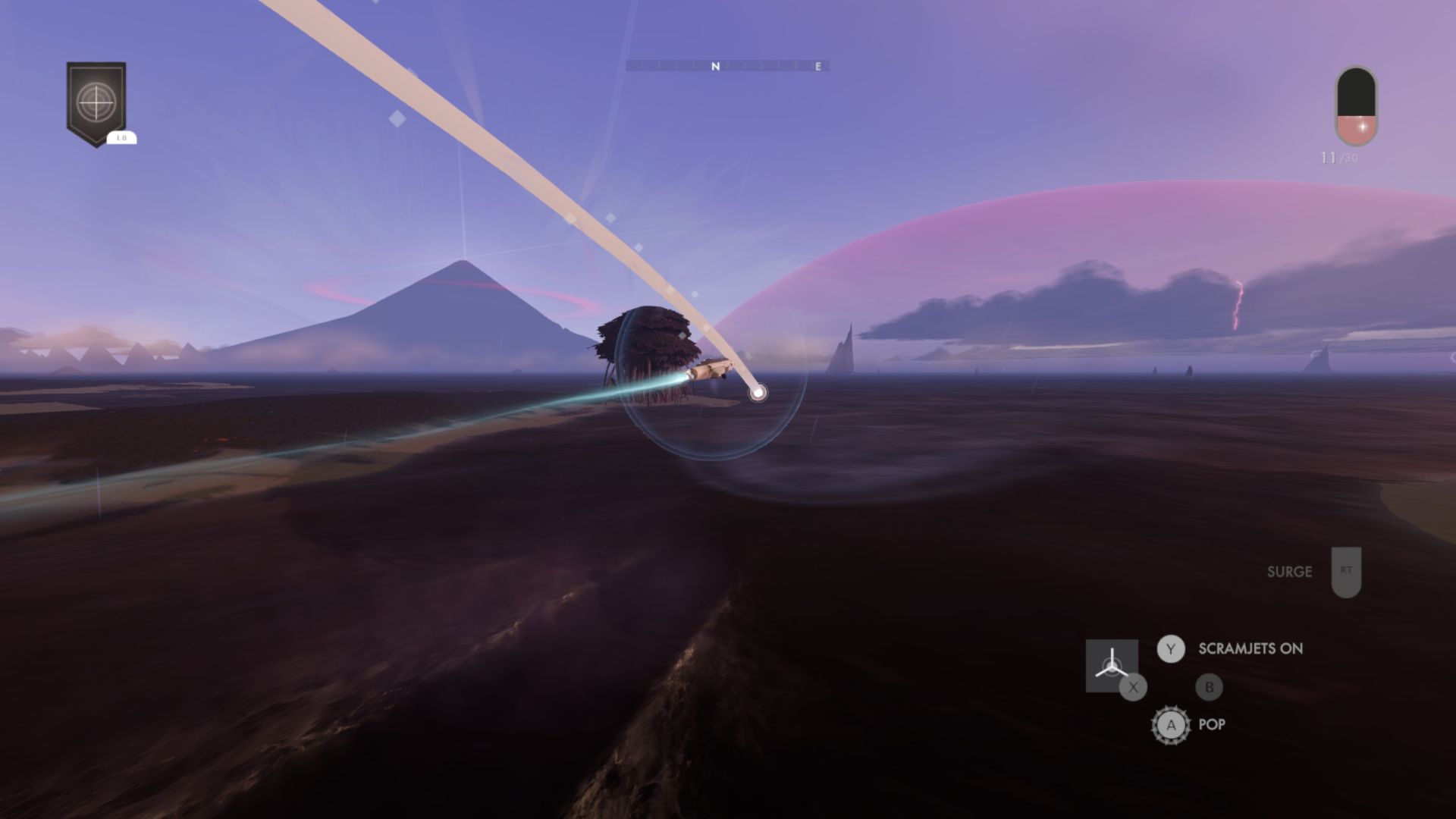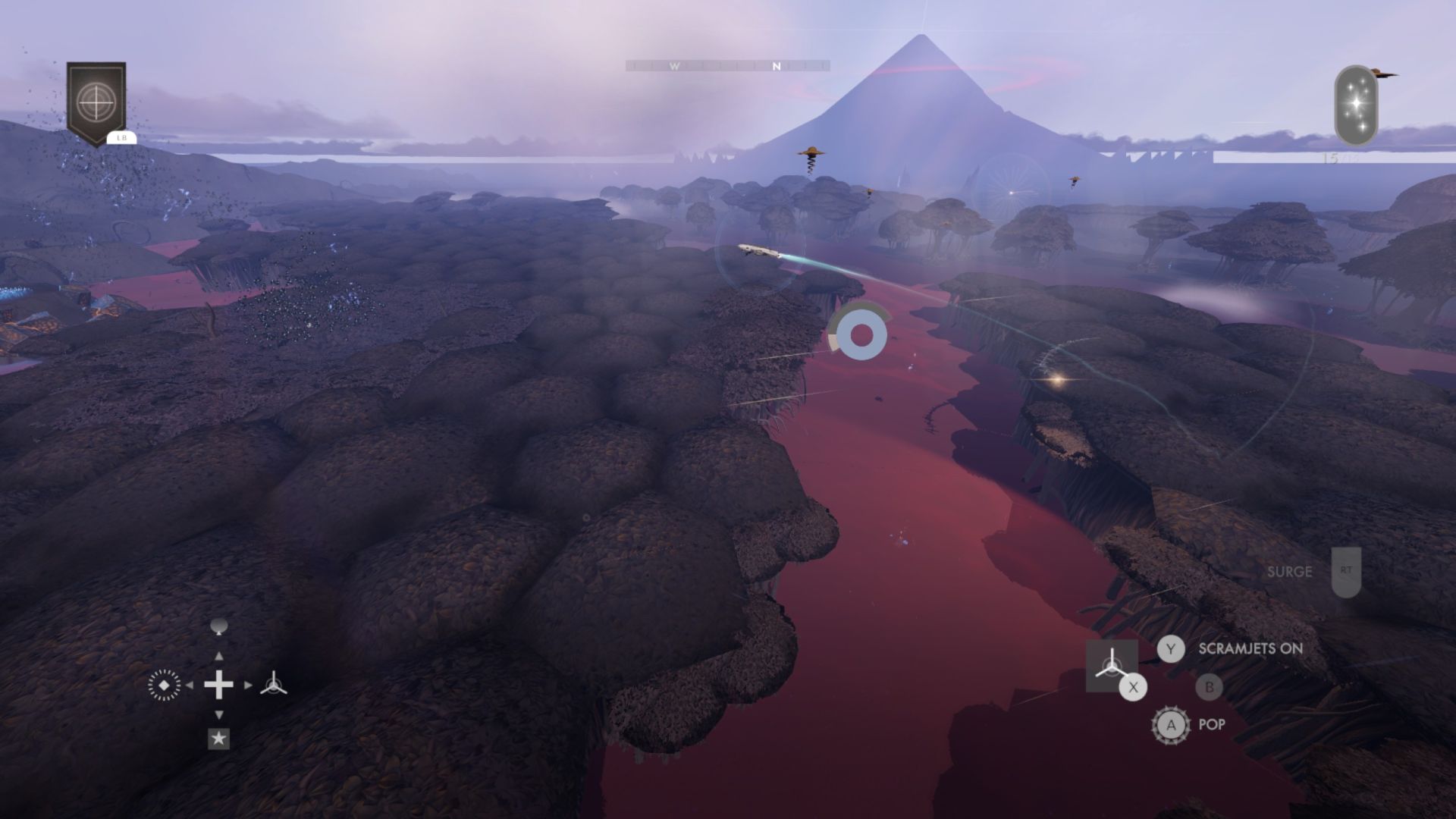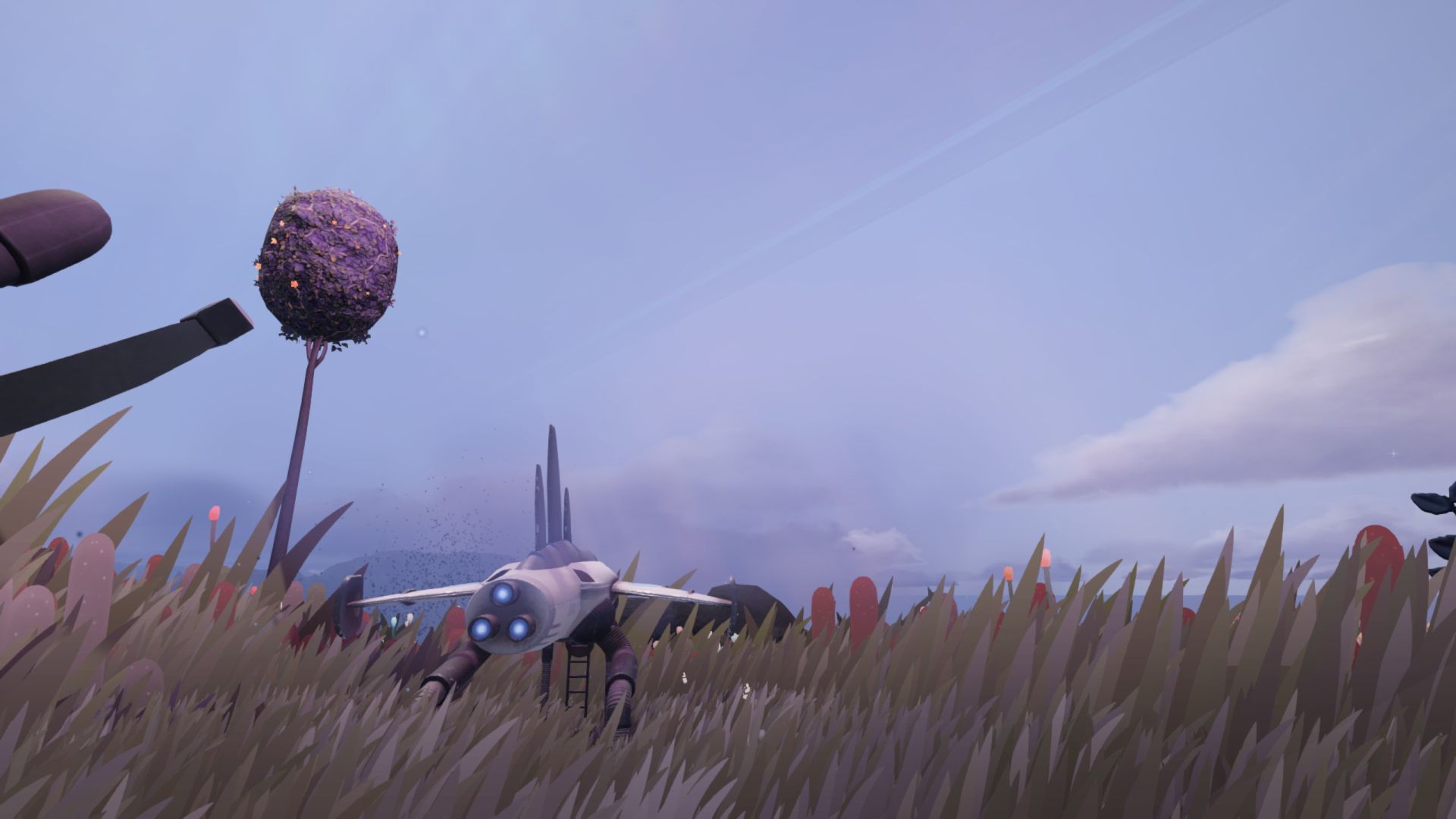“Once the story finished, I hoped an endgame would open up and allow me to play freely in its world,” I wrote in our Jett review. “That I’d have more opportunities to watch great Ghoke, the red sun, rise in real time, and to ponder the Far Shore’s fascinating mysteries at length. Instead, I could only replay previous chapters. If only Jett had embraced a rhythm as organic as its inspired ecosystem.” When the Jett team read that review, they didn’t disagree. “You put your finger on it more accurately than anybody else, which was, ‘It really feels like this is building up to some sort of systemic-focused, open world endgame,’” says Superbrothers founder Craig Adams. “And internally we were like, ‘Yeah, it is.’” What they knew, and I didn’t, was that The Far Shore was just the first part of a two-campaign story. That journey has now been completed with the launch of Given Time, a bonus 12-hour adventure that coincides with Jett’s long-awaited Steam release. After four or five hours in its company, I can confirm that Given Time is exactly the game The Far Shore gestured towards: a much looser playground for open world problem-solving, evoking both Super Mario Odyssey and Death Stranding, in which you set the pace of discovery yourself. It’s the satisfying fulfillment of Jett’s initial promise. But why such a meandering route to get there? “I can field that one,” says Adams, “because I’ve been on the project for 1,000 years with Patrick [McAllister].” Work on Jett began in 2013, with initial prototypes that hinged on zipping about in your rocket-powered vessel, interacting “somewhat nonviolently” with large creatures, and tackling environmental puzzles within an alien ecosystem. As early as 2016, Adams and McAllister had a freeroaming version of the game in which you would pick up orbs and transport them down to the ocean, where they would transform on contact with the water - a description that matches exactly the goal and structure of Given Time. “That was always the destination for Jett’s design,” says Adams. “But along the way, we started to feel like we should invest some energy in explaining what this world is. And it’s such an unorthodox design, it’s not like [a game in which] you already know how to swing a sword and use a shield and get loot. Everything about the game was a little bit odd. It felt like if we [invited] people in without drawing them in narratively, it would be a struggle.” Then came No Man’s Sky, which took up much of the mindshare around the idea of procedurally generated alien worlds. And so the Jett team decided they needed to add something else to the mix. “We always had in mind these characters in this story, and a little bit of on-foot,” says Adams. “And I felt like if we strengthened that part of things, it would help to draw people in to get them to care about what’s happening. And that might be a ramp up to getting them involved in that more immersive sim thing.” The 2016 walking sim Firewatch was an important inspiration, and Jett consequently evolved to encompass the first-person story sequences that made up much of The Far Shore’s runtime. Beautiful as they were - and arguably necessary, for the gradual unfurling of Jett’s unusual premise and universe - they were also responsible for the jolting, prescriptive tempo of that first campaign, which never quite reached the place of freedom demonstrated by those early prototypes. At one point, the Jett team was working on The Far Shore and Given Time simultaneously, and planned to ship them together. “We had in mind that it would be funny to roll credits, and then surprise people with this semi-secret sequel,” says Adams. “The last episode was gonna be where we had finally taught you everything, we could cut you loose, and it was all about that systemic, exploration gameplay. And so that format had been in place and that’s what we were driving towards.” For a couple of years, after Thief legend Randy Smith rolled onto the project full-time as design and gameplay lead, it seemed like it might happen: “But we had to look at breaking it apart, because we needed to have all hands on deck to make sure that The Far Shore turned out the way that we wanted it to.” As Adams notes, there is a poetic upside to the “clean break” the team made between campaigns. At the close of The Far Shore, protagonist Mei and her fellow scouts fell into ‘torpor’, bedding down at Ground Control until such time as their research mission could be completed. Returning to her perspective after more than a year away to become sleepily reacquainted with the controls and characters feels apt. And of course, those who discover Jett for the first time on Steam this month will get to experience the whole journey as one, the way it was originally intended. Richard Flanagan, the former indie developer behind FRACT OSC - more recently swept up by the “Ubisoft Montreal vortex”, as Adams puts it - joined the Given Time team as a design advisor. “And when Craig first brought me on, I could see how much work had gone into [The Far Shore], this really cool, really special game, how good it felt,” he says. “But I could also see that there were some loose ends. And I was fully prepared to walk back in [after playing Given Time] and tell their team to walk away. ‘You’ve made something good, this is a lot of work, it’s tiring’. But after playing Given Time, I was like, ‘You have to ship this now. Because it’s really good and it’s almost done.’ And that throughline between the two pieces was very present.” After the pioneering momentum of The Far Shore, the new campaign picks up in an intentionally “odd place”. Having followed a prophecy to a new world, Mei is confronted by self-doubt, the scepticism of non-believers, and the ghosts of the family she left behind on a fracturing planet. “It’s a bit of a dark middle chapter with a payoff,” says Adams, who once studied climate science. “And we wanted it to have that kind of a shape. Time has passed, the characters are a little weathered, and there’s an interesting flavour that comes from that kind of thing.” It strikes me as very much a story conceived by game developers, who are all very familiar with the morale-challenging slump which forms at any long creative project’s halfway point. “There’s a lot of parallels between the story of Jett and the making of Jett, I’ll say,” laughs Adams. “It took 1,000 years, that’s true in terms of making the trip to The Far Shore. It’s a bunch of good people struggling against adversity to win the day as best as they can.” Given Time’s dialogue retains Jett’s peculiar and alluring voice, which is stoic and spiritual - earnest in a way Superbrothers’ beloved Sword and Sworcery EP never was. Adams created mind maps that positioned specific characters somewhere between Tolstoy, Tom Wolfe and Moby Dick. “Without really being able to explain it to myself, I found that Jett had this lingo that it wanted to have,” he says. “These specific words and phrases that suited.” The scouts speak in science-tinged scripture about the Hymnwave, and refer to the Far Shore’s new awakening as a ‘jubilee’. But they also talk of Boombuds and Polypops, giving their new discoveries memorably playful names. “A lot of those Jett-isms would blend into a lot of our jokes and the rest of our lives,” says Zack Wheeler, a designer and QA lead. “‘Tsosi bless’ is a common phrase in the QA Slack channel.” During the making of The Far Shore, Adams bounced his writing off Randy Smith, Nick Suttner and Terri Brosius - the latter of whom once helped shape Thief’s distinctive language of Hammers and Taffers. For Given Time, the British writer Dan Berry took on that role. “My idea was to come in and leave none of my own fingerprints on it,” he says. “It couldn’t start being something else as soon as I started touching it. And there was a level of ambiguity in the story already, and things that were alluded to and spoken around in the way that the scouts spoke to each other.” With explicit story moments spread sparsely throughout Given Time, the team had less space in which to achieve the kind of thematic resonance they were shooting for. But it’s a balance Adams is more than content with. “I think that the ideal story experience is in Given Time,” he says. “And it comes in the form of, you’re just spacing out listening to music, going from island to island, or working on something. But you’ve got all this texture to soak in, and the memories of what happened in The Far Shore, and all the different themes just sloshing around in your head.” It’s an experience I can attest to. Given Time exists in a zen space where creative problem-solving and matters of plot drift pleasantly in and out of focus as you enjoy the “gooey” controls of your Jett and allow the heady mood to wash over you. It’s as if you’re slowly tuning a radio toward a specific signal - searching for the Hymnwave, but in no hurry to get there, surfing on the soothing crackle of alien noise that comes through.



